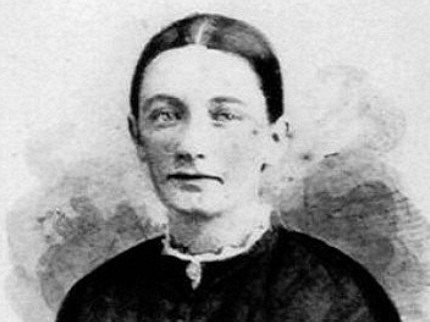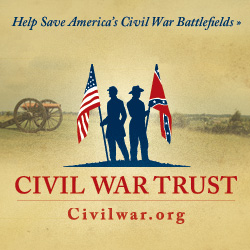 As the armies melted away from Gettysburg the horror was just beginning for the town and surrounding community. Nurses and volunteers flowed in from as far as New Jersey even before the fighting had ended. One such volunteer was Cornelia Hancock. Hancock was born on February 8, 1840 in southern New Jersey and was one of five children of a Quaker family. By 1863 her brother and “every male relative” she knew had left for the seat or war, thus Hancock was determined to do her part. That opportunity came during the concluding hours of the Battle of Gettysburg when the call went out for volunteers to help care for the massive amount of wounded and dead. She left home and arrived with other female volunteers in Philadelphia, and then on to Gettysburg by the close of the battle. (Cornelia Hancock, Letters of a Civil War Nurse: Cornelia Hancock, 1863-1865, University of Nebraska Press, 1971, 2-3)
As the armies melted away from Gettysburg the horror was just beginning for the town and surrounding community. Nurses and volunteers flowed in from as far as New Jersey even before the fighting had ended. One such volunteer was Cornelia Hancock. Hancock was born on February 8, 1840 in southern New Jersey and was one of five children of a Quaker family. By 1863 her brother and “every male relative” she knew had left for the seat or war, thus Hancock was determined to do her part. That opportunity came during the concluding hours of the Battle of Gettysburg when the call went out for volunteers to help care for the massive amount of wounded and dead. She left home and arrived with other female volunteers in Philadelphia, and then on to Gettysburg by the close of the battle. (Cornelia Hancock, Letters of a Civil War Nurse: Cornelia Hancock, 1863-1865, University of Nebraska Press, 1971, 2-3)
When Hancock arrived she observed that virtually every standing structure in Gettysburg had been “converted into a temporary hospital.” Her first stop to help the wounded was a church where she “saw for the first time what war meant.” The bodies of the wounded, dying and even the dead were strewn about everywhere and on everything, she exclaimed. Some writhed about in pain, others simply were incapacitated. Hancock noted that it was essentially a “sea of anguish.” (4-5)
Reid Mitchell’s study of the Civil War soldier and his relationship with home titled The Vacant Chair, argued that it was a “domestic imagery” that shaped the “ways in which northern soldiers experienced the Civil War.” A soldier’s relationship with their families, and in particular their mothers, informed their experiences and even their expectations of war. It not only impacted how they interpreted the war, but how they understood the idea of fighting for Union as the same as fighting for their families. Mitchell’s thesis is somewhat controversial according to Eric T. Dean, who wrote an excellent essay, “The Awful Shock and Rage of Battle” Rethinking the Meaning and Consequences of Combat in the Civil War. In it he argued that social historians such as Mitchell overstate the social construction of things like domesticity and courage as experience shaping (framing) devices for the soldier. Dean frankly states that for the soldiers “on the ground,” the carnage was so “shocking, horrific and wrenching” that they were forced into a “kind of alienation from all that is normal, civil and decent.” (5-6)
Both Mitchell and Dean’s assessments are well argued, which is why I mention them with regard to Cornelia Hancock. She was a sister and friend to many soldiers and thought it her duty to do her bit. She openly talked about the selfless nature of the soldier, even wounded, who begged her to move on to someone else more injured. How soldiers and officers went out of their way to make sure she was fine and taken care of. There is much truth to Victorian era values and how they indeed shaped the behavior of the men. After the battle Hancock received a letter from a wounded soldier she tended to and he thanked her stating, “you little know the pleasure a soldier feels in seeing a woman in camp.” Indeed, an interesting comment from a soldier after experiencing a terrible battle and its chaotic aftermath. That he thought to thank her for just being, well, a woman is important to note.(13)
Dean is also spot on as, indeed, the shock and horror of battle did things to men physically and emotionally that few in the 19th century truly understood. Hancock herself is overwhelmed by what she sees, smells, and hears AFTER the battle. This also brings up an interesting point that has been argued by many historians as to the experience of witnessing a battle. Earl J. Hess in his excellent book The Union Soldier in Battle, examines the transition of becoming a soldier identifying a “crossing over” experience after fighting.
I think there is also a disconnect and gulf that is instantly placed between the soldier in the field and loved ones at home after experiencing battle. The soldier, once crossing over, can never go back to a state of “normalcy” in his relationship with home and family. Though not because of any cult of domesticity or redefining of courage (Gerald F. Linderman’s Embattled Courage: The Experience of Combat in the American Civil War), but in the simple hard fact that those back home could never understand or appreciate the horror of a Civil War battle as the soldier did. As noted above, Hancock was obviously shocked by the destruction she found around Gettysburg.
Another question that historians contemplate is the idea of “honor” and glory” with regard to the battlefield. Both were important values for people living at the time, we know this. Linderman does a fine job in his work discussing the role of Victorian era values. So how did these simple and perhaps to us “simplistic” values play with regard to how soldiers and civilians understood war? Women (mothers) played an important role in shaping the soldier before he left home. And they indeed played a role with regard to their son’s experiences. I have read accounts in newspapers where Union mothers stood up at town meetings and volunteered their sons on the spot—one even threatened to disown her two sons if they were not among the first to enlist in 1861. (See my history of the 11th Wisconsin.)
Back to Cornelia Hancock for more on this and other thoughts.
Hancock soon traveled to a field hospital outside of Gettysburg hoping to see “some familiar faces among the regiments of my native state.” The short journey was yet another awe inspiring event as she “began to realize that war had other horrors than the sufferings of the wounded or the desolation of the bereft.” By now the smells of the rotten and decaying bodies and animals settled in delivering an “overpowering, awful stench… on which the July sun was mercilessly shining.” She was now on the battlefield as she made her way to the field hospital. It was here that the war became palpable to someone who had never witnessed such carnage.(4)
She continued, “Not the presence of the dead bodies themselves, swollen and disfigured as they were, and lying in heaps on every side, was as awful to one spectator as that deadly, nauseating atmosphere which robbed the battlefield of its glory, the survivors of their victory, and the wounded of what little chance of life was left to them.” (5)
A very poignant and important remark. The year was 1863, and the only person here talking about the “glory” of war was a woman who loved her country, who loved the men that left her to go fight, but simply had no context, no frame of reference to draw from as to the realities of war. By 1863 its hard to find any soldier speaking of the glory of a battlefield. Hancock realized too late that the horror of war had indeed robbed it of any glory, even for the victors.




Add One